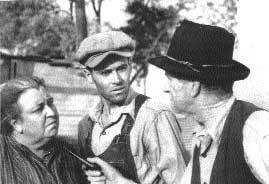
| HOME |
| NERVE |
| REVIEWS |
| ARCHIVE |
| EVENTS |
| LINKS |
| ABOUT US |
| CONTRIBUTORS |
| BACK ISSUES |
| CONTACT US |
Stuffiness and Exclusion
Of Mice and Men
Liverpool Playhouse 11th – 22th of Feb by Birmingham Repertory Theatre
Reviewed by Lisa Rydell
 The
works of John Steinbeck are always an experience, in whichever form it
may be – books, theatre or film. The stage adaptation of the well-known
story Of Mice and Men at The Playhouse was indeed an impressive production.
Starting off with a great entry that caught your attention, and then continued
to hold it for the rest of the play, the actors managed to convey Steinbeck’s
multifaceted characters; nothing is ever black or white and no one is
either good or evil.They made a very strong impression as real humans
nothing simplified, but just real life.
The
works of John Steinbeck are always an experience, in whichever form it
may be – books, theatre or film. The stage adaptation of the well-known
story Of Mice and Men at The Playhouse was indeed an impressive production.
Starting off with a great entry that caught your attention, and then continued
to hold it for the rest of the play, the actors managed to convey Steinbeck’s
multifaceted characters; nothing is ever black or white and no one is
either good or evil.They made a very strong impression as real humans
nothing simplified, but just real life.
One example of this is Curley’s wife (played by Joanne Moseley). Being married to the boss’s son, she’s has no economic worries, but instead she has no real life either. Young and newly-wed, the marriage was a way of getting out, not having to live with her oppressive mother anymore. But instead of being free, she finds herself in another kind of prison. Firstly you are led to believe she is selfish, trying to drag each and everyone of the men into her net for her own entertainment, not caring at all what harm she might cause to others in doing so. But as the story unwinds we see she is far more complex; she’s about to suffocate! Her new life turned out to be a sort of existence rather than real life, and she’s about as locked in the house as possible is, without material locks and chains. Not satisfied with sitting inside all day, cooking, cleaning, feeling her life running away – she seeks the company of the men.
One of the main themes for the
story is the relation between suffocation and exclusion, a good example
of this is Crooks (Tyrone Huggins), the stable buck. Being black he knows
more about exclusion than anybody else, and as he
so ably puts it; ‘books ain’t no good a guy needs someone
to be with’. Loneliness, with and without people, physical and psychological
is one of the major themes of Steinbecks classic and is made abundantly
clear in this production. All the men at the farm are alone in themselves,
however much they are surrounded by others.
Another, no less important theme of the play is the importance of dreams. The importance of utopia; of looking forward, of hoping and longing for something. We all need dreams in order to survive, to manage to continue walking. Dreams are what keep all the stage characters up and going, and the loss of dreams are also what can kill them in the end.